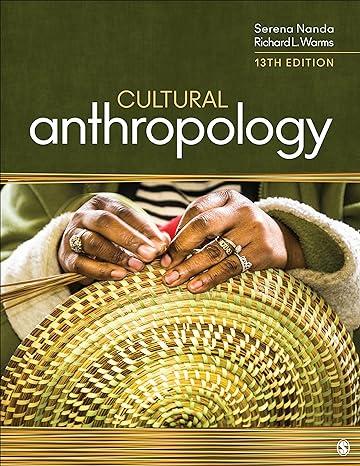The Minangkabau, a rice-growing society in West Sumatra, Indonesia, is one of the few matrilineal Islamic societies
Question:
The Minangkabau, a rice-growing society in West Sumatra, Indonesia, is one of the few matrilineal Islamic societies in South Asia. In Minangkabau villages, kinship relations and families are organized around mothers and their daughters and sons. Anthropologist Evelyn Blackwood (2000) has worked among the Minangkabau since the late 1980s, and her work gives us insight into Minangkabau culture. Minangkabau women wield both formal and informal power in their families and their matrilineages. They own rice land and participate in decisions regarding life-cycle ceremonies. After marriage, residence is matrilocal, so daughters' husbands move into their wives' houses. Inheritance is matrilineal, so most land and property are transmitted from mothers to daughters.
The members of a matrihouse share resources in complex ways, guided by the high value the Minangkabau place on cooperation and assistance among kin as well as on their belief that those who earn an income have some rights over how to dispose of it. A family's main income comes from the rice land belonging to the matrihouse and is used to pay for common household needs. In some matrihouses, mother and daughters share the produce of their undivided rice fields. Women may also have access to their own income, either from their husbands, through their own labor, or from small-scale businesses, and they may use some of this income for joint projects benefiting the matrihouse.
The senior woman manages the household, and all matrihouse members are expected to contribute some form of unpaid labor or cash to the household. Boys and girls watch younger siblings, girls help their mothers clean the house, and boys tend to small animals. Unmarried daughters weed the rice fields; adult daughters plant, weed, and harvest rice on the family land. Unmarried sons help with the harvest and transport unhusked rice to be milled. As senior women become elderly, the management of the household falls more to their daughters, as do the work and supervision of the rice fields.
Although married sons are not present in the daily life of the matrihouse, they remain kinsmen and have responsibilities and obligations that are contingent on their age and rank. Sons maintain a strong interest in and support for their natal kin group, and a son's cooperation with his mother helps ensure her continued support of his interests. A mother displeased with her son may take back some rice land she has given him or refuse him the right to return to the house after a divorce. Apart from practical considerations, a man feels emotionally tied to his mother. Young unmarried Minangkabau men who work for wages in other parts of Indonesia usually send home some of their wages to their mothers. These filial obligations last throughout a man's lifetime. Even after marriage, a son remains part of the matrilineal family with a voice in family matters and even substantial influence if he has proven a reliable helper to the matrihouse....
Critical Thinking Questions
1. What are the sources of women's power among the Minangkabaus?
2. What are the most important male and female roles in Minangkabau society?
3. Compare the sources of conflict in a matrilineal society like the Minangkabau with those in a patrilineal society.
Step by Step Answer:






